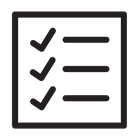Resource Crosswalk
The resources presented in this Crosswalk lend support to districts, schools, and classrooms in the continuous improvement process.
Explore the Crosswalk by selecting the content areas on the left navigation below and then select the resources appearing to the right to learn more.
Reflection and Adjustment
The following resources lend support to collecting and analyzing data to refine plans.
| Description | Type | Length | Certificate |
|---|---|---|---|
Access to the General Education Curriculum/Literacy Access for ALLThis FREE, 10-part video series containing over 70 coaching videos and hundreds of resources explores strategies grounded in research that are designed to ensure ALL learners have access to the general curriculum. |
 |
 |
 |
Achievement vs LearningA 10 Minutes with Barb and Ron conversation with Melissa Emler from Wisconsin‘s "UDL Forward" Part 1 |
 |
 |
|
Age-Appropriate Transition Assessment Planning GuideThroughout this guide, you will be introduced to the planning process for transition assessment. It is important we intentionally plan for transition assessment to ensure we reduce duplication, build on a student’s progress, and identify individualized assessment to build the youth’s profile in relationship to those skills needed for their adult life goals. |
 |
 |
|
Back to School Theme 3A 10 Minutes with Barb and Ron looking closely at executive functions such as goal setting, planning and strategy, and several others. |
 |
 |
|
Designing for the Least Restrictive Environment in General EducationLeast Restrictive Environment (LRE) is a critical principle of the Individuals with Disabilities Education Act (IDEA). School districts and families often struggle with WHERE and HOW to ensure LRE. What does the law really say? How can we use the UDL framework to reduce barriers and ensure that the general education classroom is the least restrictive environment? This presentation offers an engaging discussion that will stretch our thinking, allow for collaboration, and improve outcomes for each and every learner! |
 |
 |
|
Effective Practices: Supporting Youth In School, In the Community and On the Job and Predictors of Post School SuccessEffective Practices and Predictors are research-based strategies that focus on supporting transition age youth to gain critical skills and experiences. The Practices and Predictors are useful to transition professionals in school and agencies across systems and in multiple environments. |
 |
 |
|
ELSA (Employability/Life Skills Assessment)ELSA is an informal assessment to gather information about a student or youth’s current abilities with 24 employability and life skills. |
 |
 |
|
Empowering Student VoiceA 10 Minutes with Barb and Ron discussion about empowering student voice. |
 |
 |
|
Expert Learners Through the Lens: How do Kids Know What Helps Them LearnA 10 Minutes with Barb and Ron discussion on Expert Learners. |
 |
 |
|
Inclusive Practices That Support Learners With Complex NeedsAre Individual Education Programs (IEPs) driving the changes that we want for our learners who are eligible for special education? Or have they become a boilerplate document that teams complete, but don’t use to full capacity within the classroom? The intent of the federal law IDEA is “ensuring equality of opportunity, full participation, independent living, and economic self-sufficiency for individuals with disabilities.” |
 |
 |
|
MTSS and the 3 tiersA 10 Minutes with Barb and Ron discussion about Multi-Tiered System of Support (MTSS) and why clear goals are extremely important, especially in Tier 2 and Tier 3. |
 |
 |
|
Rethinking the Design and Implementation of Individualized Education Programs Through a UDL LensAre Individual Education Programs (IEPs) driving the changes that we want for our learners who are eligible for special education? Or have they become a boilerplate document that teams complete, but don’t use to full capacity within the classroom? The intent of the federal law IDEA is “ensuring equality of opportunity, full participation, independent living, and economic self-sufficiency for individuals with disabilities.” |
 |
 |
|
The Power of Questions in a UDL EnvironmentThe presenter in this webinar will assist you in discovering the importance and need for well-crafted questions in the classroom. Teaching students how to form questions increases engagement (Engagement, one of the UDL Principles) while thrusting students‘ imaginations into the future to be college or job capable. |
 |
 |
|
Transition Assessment and Transition Planning, InspirED Webinar SeriesExplore a 3 part InspirED series on Transition Assessment and Transition Planning offering good foundational information for all team members serving transition youth (special educators, general educators, therapists, transition coordinators, paraprofessionals, etc.) |
 |
 |
 |
Universal Design for Learning and Explicit InstructionA 10 Minutes with Barb and Ron about Universal Design for Learning and Explicit Instruction. |
 |
 |
|
Using UDL to Leverage Co-PlanningDo you regularly collaborate with co-teachers or other school staff to proactively plan to support the learning of all of your students in the general education classroom? If you are a general education teacher, intervention specialist, ESL teacher, speech-language pathologist, OT/PT, title teacher or another collaborative teacher, then this webinar is for you. Join us as we discuss how to use UDL to leverage co-planning. Bring your best ideas as we discuss how to make these partnerships work for the benefit of all students. |
 |
 |
|
Weaving the UDL Framework with Specially Designed Instruction: A Beautiful Tapestry with and without disabilitiesA quick 30 minutes on how Specially Designed Instruction compliments Universal Design for Learning. |
 |
 |